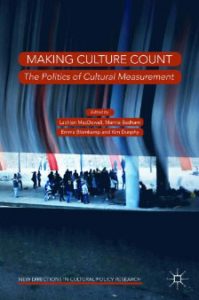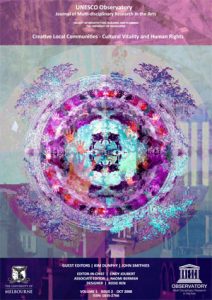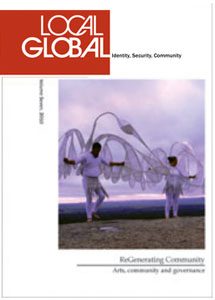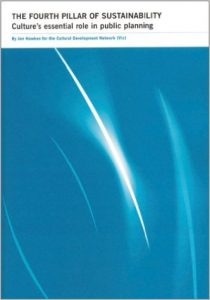CDN has undertaken a range of research projects as well as producing and contributing to a number of publications that assist in our aim of promoting cultural vitality.
Positing a schema of measurable outcomes of cultural engagement
by Kim Dunphy, John Smithies, Surajen Uppal, Holly Schauble, and Amy Stevenson in the journal Evaluation, September 2020
CDN’s work over 17 years has been based on the proposition that culture is a significant domain of public policy. Since 2003, CDN has conducted multiple research and development projects with a range of artists, producers and governments in Australia to establish the building blocks of a cultural policy domain. In 2016, CDN made its findings public by articulating the five measurable cultural outcomes and began four years of trials both in Australia and internationally to validate them as a useful measure. This article presents the Schema of measurable outcomes as well as outlining how the schema was developed.
Australia
by Surajen Uppal & John Smithies. In Cultural Governance in a Global Context, 2019
Editors: Annick Schramme and Ian W. King
 This book explores the character of cultural governance of arts and cultural institutions in eight countries across five continents. Examining strategy and decision making at an organisational level, this is the first empirical contribution on cultural policy and management, revealing how it is applied across the globe in otherwise unexplored countries. CDN has contributed the chapter on governance in Australia in which the five Measurable Cultural Outcomes are outlined and their implications for governance are explored.
This book explores the character of cultural governance of arts and cultural institutions in eight countries across five continents. Examining strategy and decision making at an organisational level, this is the first empirical contribution on cultural policy and management, revealing how it is applied across the globe in otherwise unexplored countries. CDN has contributed the chapter on governance in Australia in which the five Measurable Cultural Outcomes are outlined and their implications for governance are explored.
Report on the National Local Government Cultural Forum initiative 2013-2018
by Amy Stevenson, John Smithies & Kim Dunphy. (2019) Melbourne: Cultural Development Network
The five year National Local Government Cultural Forum was brought to a close with the release of the final report. The Forum brought together cultural policy and practice managers from across Australian jurisdictions and was the first time that policy and practice in this field had come together. The Forum acted as a clearing house for CDN’s research and the development of the planning and evaluation frameworks. This report summarises the activities of the Forum, key research and outputs of the initiative as well as evaluation from the Forum members.
Local Government Cultural Data (Inputs and Outputs). A report on the national data collection trial 2014-2018
by Amy Stevenson, Kim Dunphy & John Smithies. (2019) Melbourne: Cultural development Network
The aim of this research was to define and report the scope and quality of council-led cultural investment and activity. This document reports the findings of that project.
Outcome‐focussed planning in Australian local government: How council plans and cultural development plans measure up
by Surajen Uppal & Kim Dunphy in the Australian Journal of Public Administration, January 2019
Contemporary public policy increasingly emphasises a focus on outcomes, the difference that occurs in the lives of citizens from policy and activity of government. Other contemporary imperatives for effective planning include: recognition of the values of the community whom plans serve, direction towards goals and objectives, utilisation of evidence, articulation of theories of change that underpin planning and responsiveness to evaluation. This article reports a desk‐based research project to assess how local government planning documents meet these imperatives. Two documents are examined for 67 councils across Australia: the major strategic document, council plan or other‐named document and the cultural development plan (CDP) or other‐named document that directs staff and investment aimed at cultural enrichment of the LGA. Findings indicate that the majority of councils’ documents appeared only concordant with one or two of these planning imperatives. No plan addressed more than three. Overall, council plans and cultural development plans did not clearly indicate their responsiveness to values of their communities, nor include objectives that formed measurable steps towards goals or formally refer to the use of evidence in decision‐making. No plans included theories of change to underpin decision‐making. This analysis indicates clear areas of improvement for planning for local governance.
Three Bark Canoes – Project Evaluation Report
by Peter Phipps & David Pollock, January 2019
The Three Bark Canoes project was developed by the community arts organisation, Wurinbeena Ltd. This organisation is comprised of Elders and Aboriginal and non-Indigenous members of communities in East Gippsland. Objectives of this project included connecting young men with their cultural heritage and bridging some of the social cleavages which exist within and across those communities. A team of researchers tracked the project across most of 2017 and its afterlife up to September 2018 as part of an evaluation they were commissioned to undertake on behalf of the Cultural Development Network.
When culture counts
by John Smithies in Multiple Perspectives on Culture Counts, Cultural Trends, Volume 26, Issue 4, November 2017
The introduction of the Culture Counts system in Australia has disturbed the cultural sector (arts, libraries and heritage) as it highlighted the existing lack of consistent, and therefore meaningful, evaluation of cultural activities.
In this opinion piece, Smithies writes in defence of Culture Counts as an innovative technology that set out to solve the problem of understanding how audiences, peers and artists think about the quality of work, and has since included broader impacts. However, in advance of this defence, he summarises the position of Cultural Development Network (CDN) – which is that the quality of the “work” to any group is not the most important aspect to measure. Read more
Cultural impact assessment: a systematic literature review of current methods and practice around the world, 2016
Adriana Partal and Kim Dunphy.
This article presents the results of a systematic literature review on applications of cultural impact assessment (CIA) internationally.
Analysis of Victorian Councils’ Cultural Development Plans, 2015
Kim Dunphy and Leda Yazgin
This report presents the findings of an assessment of cultural development plans published by councils across Victoria, based on their alignment with principles for cultural development planning in CDN’s Framework for Cultural Development Planning.
Findings of survey of Victorian councils’ cultural development activity, 2015
Kim Dunphy, John Smithies et al
This report presents the findings of a survey of Victorian councils undertaken in 2014-2015, about cultural development planning, cultural facilities, leadership of communities in cultural development and planning, and engagement of artists.
A holistic framework of evaluation for arts engagement, 2015
Kim Dunphy.
This chapter proposes a holistic framework for evaluating the outcomes of arts engagement, across the domains of cultural, social, civic, environmental and economic.
 .Making Culture Count : the Politics of Cultural Measurement, 2015
.Making Culture Count : the Politics of Cultural Measurement, 2015
Editors: Lachlan MacDowall, Marnie Badham, Emma Blomkamp and Kim Dunphy.
Making Culture Count brings together diverse perspectives from scholars, policy-makers and creative practitioners to explore the burgeoning field of cultural measurement and its political implications.
(MORE)
Making Arts Central in a regional Australian community, 2015
Cynthia Lam
This short article offers a discussion of the Arts Central project that was established to build a vibrant and culturally active community in central Victoria, Australia.
Frameworks for cultural development projects, 2015
John Smithies and Kim Dunphy.
This chapter offers two frameworks developed for the specific context of cultural development in local government: a set of planning principles, and key stakeholder groups and the dynamic relationships between them.
Local councils, the arts and reconciliation, 2014
Emma Asscher
This report explores ways the local councils in Victoria are contributing to reconciliation in their communities by using the arts as a vehicle.
Evaluating outcomes of arts engagement: a holistic model, 2014
Dr. Kim Dunphy
Overview of paper presented at ENCATC Advanced Seminar: Rethinking Cultural Evaluation: Going Beyond GDP, Paris, 22 October 2014.
Cultural data for local government: research report, 2014
Leda Yazgin and Kim Dunphy
This report provides a review of data about culture, including the arts, from across Australia that local government might use for planning and evaluation.
Cultural planning practices in local government in Victoria, 2013
Kim Dunphy, Lyndall Metzke and Linda Tavelli
Results of a state-wide survey about cultural planning practices in local government across Victoria.
Cultural impact assessment: international literature review, 2013
Kim Dunphy and Adriana Partal
This reports offers a short summary of findings of an international literature review on cultural impact assessment.
The art of cultural development, 2012
John Smithies
CDN’s Director discusses how arts policies can help councils build stronger better connected communities in an issue of Local Government Managers Australia.
Measuring the contribution of culture, 2012
Kim Dunphy
CDN’s Manager documents progress about indicators for councils’ investment in cultural activities in an issue of Local Government Managers Australia.
Informed consent project
Pia Smith
This publication is a literature review and guidelines for community based art projects
Art, Governance and the Turn to Community: Putting Art at the Heart of Local Government, 2010
Martin Mulligan and Pia Smith
This report details findings of the Generations research project that sought to explore links between engagement in community based arts activities and active civic engagement.
Community Consent and the Arts, 2010
Pia Smith and John Smithies
Literature review and guidelines for participants consent in community-based arts projects. CDN for VicHealth
International literature review on cultural and arts indicators, focussing on local government, 2010
Kim Dunphy for CDN
Draft framework of arts indicators for local government, Part 1 & Part 2, 2010
Kim Dunphy for CDN
How can the impact of cultural development work in local government be measured: towards more effective planning and evaluation strategies, 2010
Kim Dunphy
Article in Local-Global journal, ReGenerating Community: Arts, community and governance, Vol. 7
Developing and Revitalizing Rural Communities Through Arts and Creativity, international research report, 2009
Kim Dunphy
This chapter investigates the revitalisation of rural communities through arts and creativity.
Local Global Journal: Regenerating Community: Arts Community and Governance, 2009
This special edition: ‘Regenerating Community: Arts, Community and Governance’ of RMIT’s journal features keynote presentations, peer-reviewed and practitioner articles based on presentations made at the ReGenerating Community: Arts, Community and Governance National Conference 2009
(MORE…)
Picture This: Increasing the cultural participation of people with a disability in Victoria, 2009
Cultural Development Network
Literature Review and community consultation, for the Office for Disability, Arts Victoria and Department of Human Services.
UNESCO E-Journal, Creative Local Communities: Cultural Vitality and Human Rights, 2008
This edition of the UNESCO Observatory, University of Melbourne, e-Journal of Multi-disciplinary Research in the Arts was produced on the topic of ‘Creative Local Communities: Cultural Vitality and Human Rights’.
Co-edited by CDN staff members Kim Dunphy and John Smithies, it features articles of interest from all around the world.
Public Art Public Housing, 2004
North Richmond Community Health Centre, Department of Human Services Neighbourhood Renewal Unit, and the Cultural Development Network.
This book celebrates the creative collaborative work of residents, artists and organisations on public housing estates across Victoria since 1999.
The Fourth Pillar of Sustainability, 2001
Jon Hawkes for the Cultural Development Network, published by Common Ground
Our most important research work and policy platform frames culture as the ‘fourth pillar’ of public policy.
(MORE…)



